- Top Scheduling Software Options for Service Businesses at a Glance
- What to Look for in Service Industry Scheduling Software
- 8 Reliable and User-Friendly Scheduling Software for Service Businesses
- FAQs About the Best Scheduling Software for Service Industries
- Best Scheduling Software for Service Business
- Related read
Last Updated on December 30, 2025 by Ewen Finser
If you run a service business, you already know that scheduling isn’t just about plugging names into a calendar.
It’s a constant balancing act: techs stuck in traffic, last-minute client cancellations, someone forgetting they swapped shifts, and suddenly your “simple day” turns into a logistical nightmare. Add in compliance rules, overtime headaches, and customers who expect instant updates, and it’s enough to make you want to go back to pen and paper.
That’s why service industry scheduling software is a lifesaver. The right tool keeps your crews on time, your customers in the loop, and your sanity intact.
I’ve tested some of the top options, from all-in-one platforms to niche tools built just for trades, salons, and field service teams. Here are my picks for the best scheduling software for service business in 2025.
Spoiler: Homebase is my go-to for small to mid-sized service companies because it bundles everything, from scheduling, time clocks, payroll, and even hiring, into one affordable app. But depending on your crew size, your industry, and how mobile your team is, you’ve got plenty of strong contenders.
Top Scheduling Software Options for Service Businesses at a Glance
Here’s a side-by-side look at the top scheduling software for service businesses so you can quickly spot which one fits your crew.
Software | Best For | Key Features | Pricing |
Homebase | All-in-one hub for small to mid service businesses | Scheduling, payroll, mobile clock-ins, hiring tools, in-app messaging | Free – $120/mo |
Housecall Pro | Home & field service teams (plumbing, cleaning, HVAC) | Drag-and-drop calendar, dispatch & route mapping, invoicing, customer portals | $59 – $299/mo |
Workyard | Contractors & field crews needing GPS time tracking | GPS time clock, job costing, mileage, payroll/accounting integrations | $50 base + $6–$13/user/mo |
Jobber | Field service teams focused on client booking & payments | Booking, quoting, route optimization, invoicing, payments, client reminders | $127 – $450/3 months |
ServiceTitan | Large, enterprise-level service companies | Live dispatch board, job/tech matching, customer tracking, full ops suite | Custom pricing |
FieldEdge | HVAC, plumbing, electrical businesses | Technician mobile app, invoicing, QuickBooks integration, real-time dispatch | Custom pricing |
Skedulo | Enterprise-scale mobile workforces | Smart scheduling, real-time maps, offline capture, enterprise integrations | Custom, volume-based |
Kickserv | Small-to-mid service shops needing simple scheduling & invoicing | Route-optimized schedules, reminders, estimates, invoicing, QuickBooks sync | $19 |
What to Look for in Service Industry Scheduling Software
Picking scheduling software isn’t about grabbing the shiniest app with the slickest marketing. It’s about finding the platform that makes running your service business less of a daily fire drill. Here’s what really matters:
Mobile-First Design
Your team isn’t sitting at a desk. They’re in vans, at client sites, or on the move. A good scheduling tool should make it effortless for them to clock in, see where they need to be, and get real-time updates straight from their phone.
Customer Booking and Dispatch
Unlike retail, service businesses live and die on customer appointments. The best software connects customer booking to your crew schedules automatically, so no one double-books or shows up at the wrong address.
Flexibility for Shift Changes
Cancellations and reschedules are part of life. Look for tools with drag-and-drop scheduling, shift swaps, and instant notifications so you can reshuffle without blowing up the whole calendar.
Compliance and Payroll Integration
Service teams rack up overtime and mileage quickly. Software that tracks hours accurately, flags potential labor law issues, and integrates with payroll will save you headaches (and potentially fines).
Scalability and Integrations
If your team grows from five techs to fifty, you don’t want to switch systems. Make sure the software integrates with invoicing, CRM, or payment tools so everything runs in sync as you scale.
8 Reliable and User-Friendly Scheduling Software for Service Businesses
So what makes scheduling software “the best” for service businesses? For me, it came down to how well it balances team organization, customer experience, and mobile-friendly tools that actually work out in the field.
1. Homebase
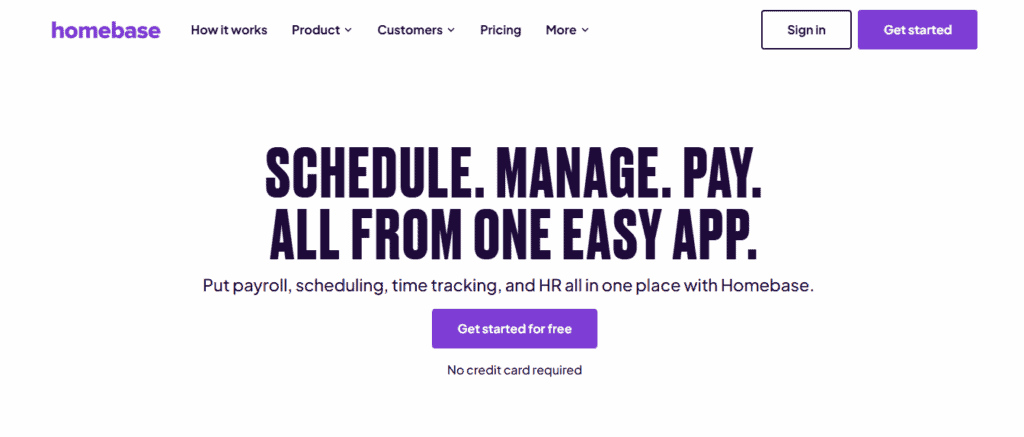
Best for service businesses that need an all-in-one hub
Homebase is hands-down one of the easiest ways to wrangle a service crew without losing your mind. It’s built with small teams in mind, but don’t let that fool you, the feature set covers just about everything you’d need if you’re running a busy service operation. Scheduling, time clocks, payroll, messaging, and even hiring tools are baked right in.
Where Homebase really shines for service businesses is how it handles people who aren’t glued to a desk. Your employees can clock in from their phones when they arrive at a job site, swap shifts if something comes up, and even get automatic reminders so you’re not chasing down no-shows. When I tested it, I liked how smooth it was to approve time-off requests and reassign jobs without creating a scheduling domino effect. For businesses where the work happens in the field, that kind of flexibility is huge.
What’s even better is that payroll connects directly with scheduling and time tracking, so once hours are approved, you’re done. There’s no exporting timesheets or double-checking entries — everything just flows. It also handles overtime and breaks automatically, catching potential compliance issues before they cause problems. Setup is quick, and once it’s running, payday becomes one less thing to worry about.
A quick look at Homebase’s pricing:
- Basic: Free
- Essentials: $30/month
- Plus: $70/month
- All-in-One: $120/month
Key features:
- Free plan with scheduling, time clocks, and hiring tools
- GPS-enabled mobile clock-ins for field teams
- Built-in payroll add-on so you don’t juggle systems
- In-app messaging to replace endless group texts
2. Housecall Pro

Best for field-service and home servicing businesses that want everything in one mobile-friendly package
Housecall Pro shines when you’re managing a team that works directly in customer homes, like HVAC, plumbers, cleaners, landscapers, or electricians. It’s built to simplify the entire service workflow, from online booking all the way to invoicing and job tracking.
When I tested Housecall Pro, the standout features were its drag-and-drop calendar paired with real-time dispatch and route mapping. You can reschedule a job with a quick drag, send an “on my way” text, and even track your techs via the GPS app. That means fewer missed appointments and more efficient routes, especially when jobs pivot mid-day. Plus, features like auto-generated estimates, paperless invoicing, and customer reminders instantly save hours of admin work.
Housecall Pro also levels up customer interaction with built-in customer portals, payment processing (even in the field), and tools to collect reviews automatically, they all help turn one-time calls into repeat jobs. It also integrates cleanly with QuickBooks and supports add-ons like pricing books, recurring service plans, and advanced reporting when you’re ready to scale.
Pricing snapshot:
- Basic: $59/month
- Essentials: $149/month
- Max: $299/month
Key features:
- Drag-and-drop scheduling and real-time dispatching
- Online booking from your website or Google
- GPS route mapping and “On My Way” client messaging
- Invoicing, payment collection, and CRM all in one
3. Workyard
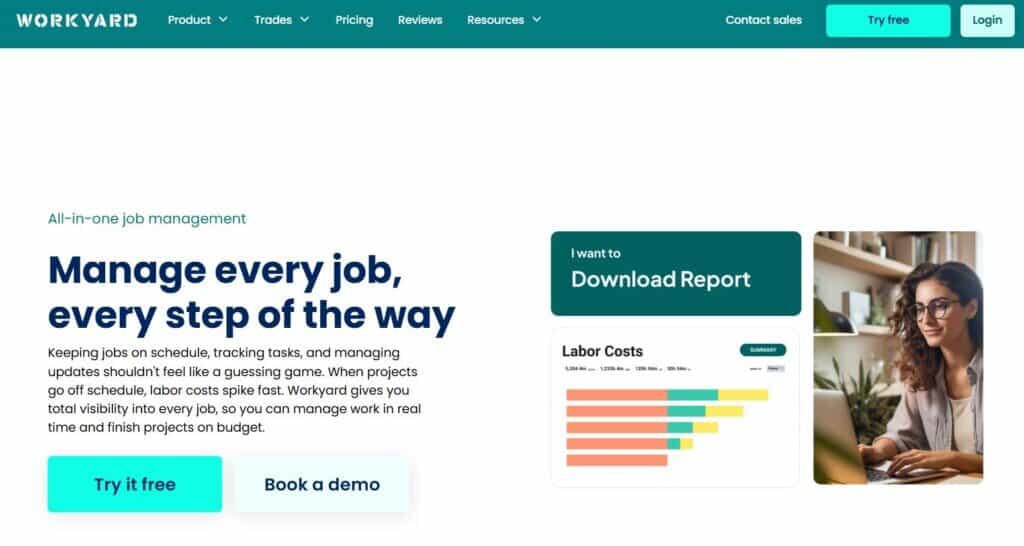
Best for contractors and field-service teams who need GPS-verified time tracking, job costing, and compliant payroll, all in one platform
Workyard stands out when you manage a team that’s always on the move, whether that’s HVAC technicians, roofers, electricians, or cleaning crews. The heart of it? A GPS-powered time clock that captures exactly when employees clock in and leave sites, even in low-signal environments. That means fewer guesswork, no buddy-punching, and better job-cost tracking all day long.
What really hit home during testing was the drag-and-drop scheduling portal and the real-time crew map: I could assign a job, stand back, and watch the field crew move into it, with every touchpoint tracked. It also collects mileage automatically, helps you stay overtime- and break-compliant, and sends everything smoothly into payroll systems like QuickBooks, ADP, and Gusto.
Plenty of contractors shared stories of efficiency: one saved over four hours per week just on payroll workload, while another avoided thousands in inflated payroll expenses by tracking actual rather than estimated arrival times.
Here’s the latest pricing snapshot I found:
- Starter (Time Tracking): $50/month base fee + $6/user/month
- Pro (Workforce Management): $50/month base fee + $13/user/month
- Enterprise: Custom quote according to your needs
Key features:
- GPS-verified, compliance-ready time tracking (photo ID & geofence-enabled)
- Real-time job scheduling, progress updates, and dispatch via mobile app
- Accurate job costing by client, location, or task, with mileage tracking
- Payroll/accounting integrations and reporting to prevent overages
4. Jobber
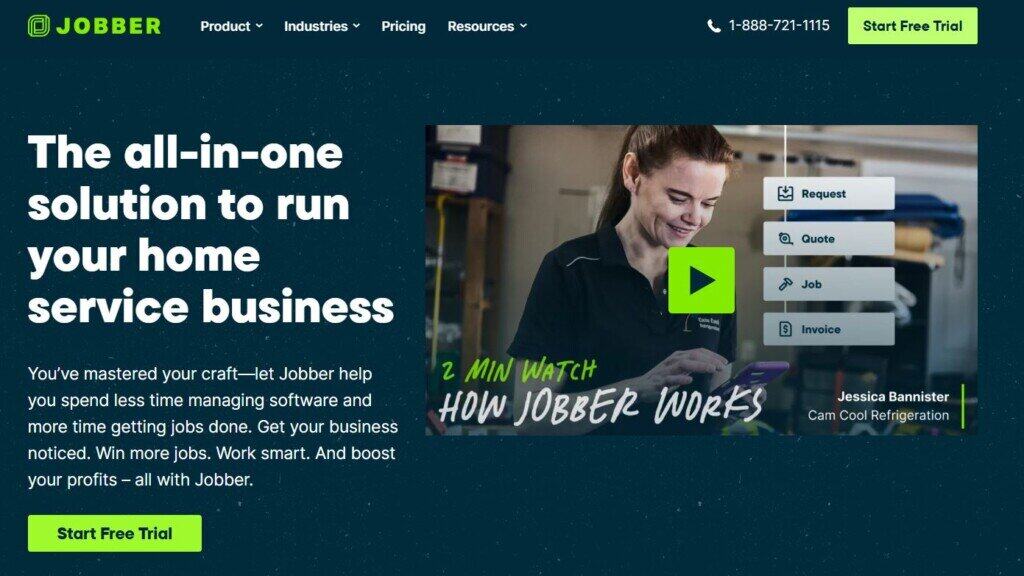
Best for home service teams that want quoting, scheduling, and invoicing all in one smart package
Jobber is built for businesses that run entirely on field visits, like plumbers, landscapers, HVAC techs, cleaners, and anyone else who clocks in at the client’s door. It’s one of those rare tools that covers the full workflow: booking, scheduling, dispatching, quotes, invoices, payments, and even marketing, all from one dashboard.
What felt really smooth during testing was how fast I could create a job, drag it onto the calendar, see who’s available, and hit “dispatch.” The app shared all job details with the crew and even plotted the most efficient route, so nobody’s wasting time zigzagging across town. Plus, customers get appointment reminders and “on my way” texts, which means fewer missed slots and fewer follow-up calls to the office.
The real magic for service pros, though, might be how it helps you get paid faster. Jobber speeds up the quoting-to-payment process dramatically and even lets customers pay right in the app or via mobile links. That ROI isn’t hypothetical, many users say Jobber saves them hours per week and helps them grow.
Pricing snapshot:
- Connect: $127/3 months (up to 5 users, includes route mapping, automations, QuickBooks sync)
- Grow: $262/3 months (up to 10 users; adds job costing, SMS, client referrals)
- Plus: $450/3 months (15 users, premium support, AI tools, Marketing Suite)
Key features:
- Online booking and automated reminders
- Drag-and-drop schedules with route optimization
- Quotes, invoicing, and payments in the field
- GPS tracking and client communication through the mobile app
5. ServiceTitan
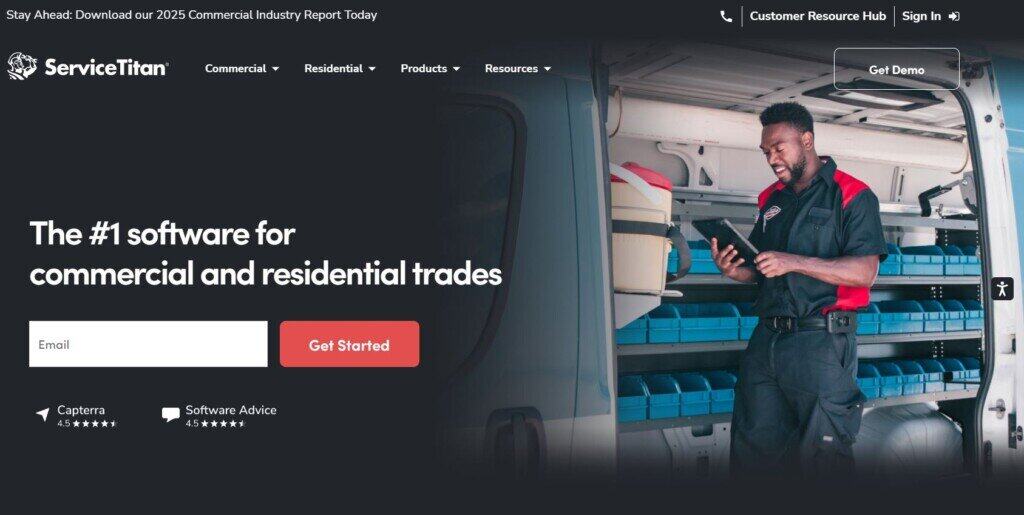
Best for large, fast-growing service companies that want enterprise-level scheduling and operations management
ServiceTitan is basically the Cadillac of service business software. It’s designed for big, multi-truck operations—think plumbing, HVAC, and electrical companies managing dozens (or hundreds) of techs in the field. Where smaller tools just handle scheduling, ServiceTitan runs the whole back office: dispatching, call booking, marketing automation, customer financing, payroll, and advanced reporting.
When I tested it, the dispatch board stood out. You can see every job in progress, track each tech on a live map, and reshuffle assignments instantly if an emergency call comes in. The system even uses customer history and job types to auto-match the right tech for each appointment, saving managers from playing phone tag all day.
It’s also highly customer-centric. Automated reminders, real-time technician tracking links, and digital invoices make you look polished and professional, even if your office is still running out of a garage. That’s why so many larger service companies swear by it: ServiceTitan doesn’t just handle scheduling, it transforms the customer experience and makes scaling possible.
Pricing snapshot:
ServiceTitan doesn’t publish standard pricing, so you’ll need a custom demo and quote. But it’s typically considered premium software, with pricing reflecting its enterprise-level scope.
Key features:
- Live dispatch board with GPS tech tracking
- Intelligent job/tech matching
- Customer notifications, reminders, and technician tracking links
- Full suite: scheduling, invoicing, payroll, reporting, and marketing automation
6. FieldEdge
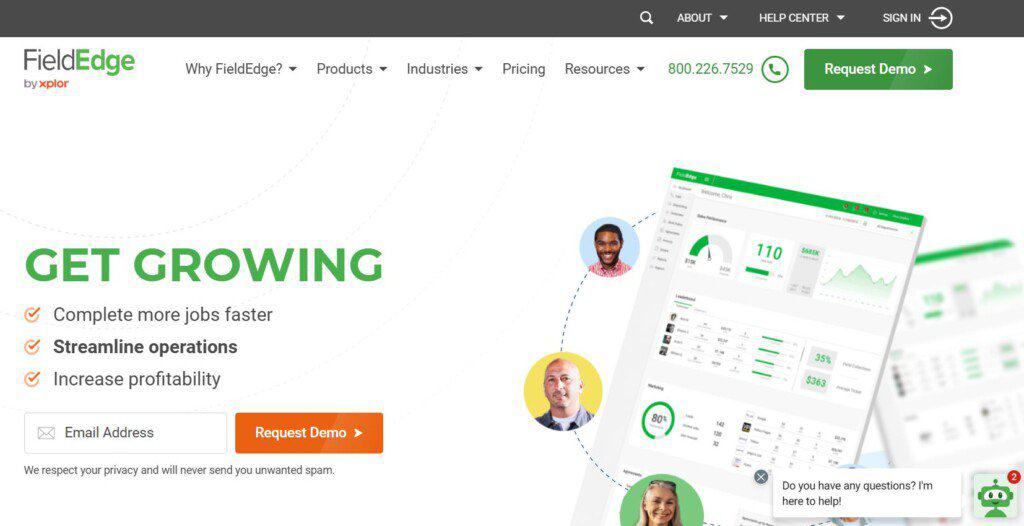
Best for HVAC, plumbing, and electrical companies that want a strong mobile app for technicians
FieldEdge has been around for decades (it used to be called dESCO), so it’s got serious street cred in the service industry. These days, it’s cloud-based and built for companies that need both office efficiency and technician empowerment out in the field.
The mobile app is where FieldEdge shines. Techs can see their schedules, job details, and customer history right from their phone or tablet. They can also create invoices, accept payments on the spot, and even upsell additional services using price books built into the app. That’s huge if you’re trying to reduce “I’ll send you the invoice later” moments.
On the office side, dispatching is straightforward, and you get live updates from the field, so if a tech finishes early, you can immediately assign them the next nearby job. It’s also tightly integrated with QuickBooks, which saves hours of double entry for accounting.
Pricing snapshot:
FieldEdge doesn’t list pricing publicly. Plans are customized depending on team size and features, but expect enterprise-level pricing.
Key features:
- Robust mobile app for field techs (scheduling, invoicing, payments)
- Real-time dispatching with live job updates
- QuickBooks integration for accounting
- Built-in price books to drive upsells and efficiency
7. Skedulo
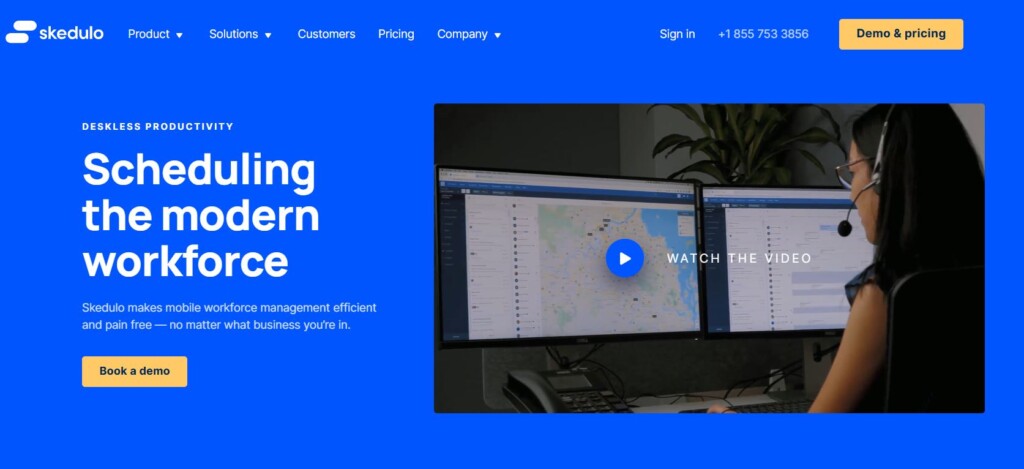
Best for field services needing smart, large-scale scheduling and real-time workforce control
Skedulo is ideal for service businesses managing mobile workforces—anything from home services and utilities to healthcare and telecom. It combines intelligent scheduling with dynamic dispatching, employee communication, and analytics, all wrapped in a platform built for scale. The interface makes matching available, qualified workers to customer jobs as intuitive as drag-and-drop, while real-time location maps and workload views let you stay in control on both ends.
- Dynamic messaging and notifications: Workers get updates directly on their mobile devices.
- Work offers and shift templates: Instantly fill gaps based on skills, region, or availability.
- Offline mobile capture: Track hours, attach job photos, and collect forms even without service.
- Enterprise integrations: Seamlessly integrates with Salesforce, Zendesk, Microsoft Dynamics, and more.
- Volume-based pricing: Tailored to mobile-heavy businesses, pricing scales with workforce size.
8. Kickserv
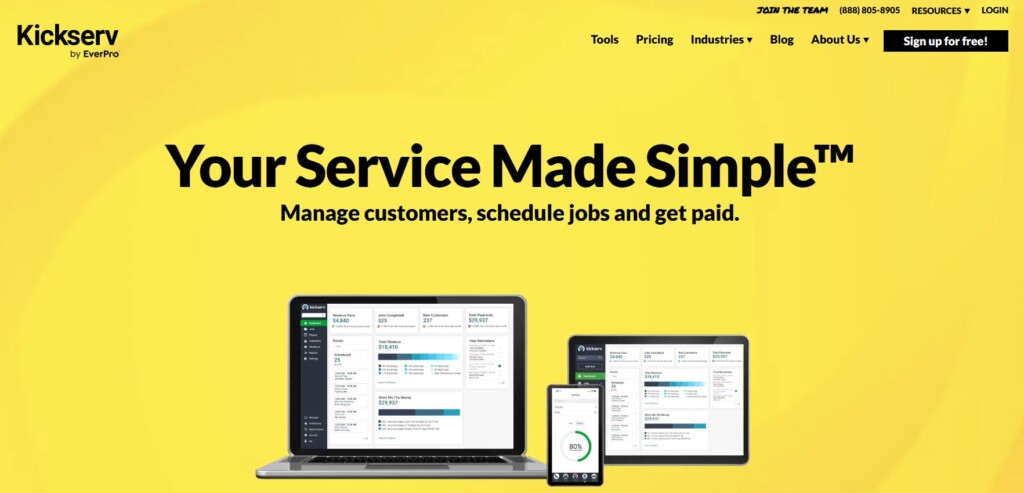
Best for small-to-medium home service businesses wanting easy scheduling, estimations, and invoicing
Kickserv caters to businesses like plumbers, HVAC techs, and landscapers by giving you a unified toolset for client contacts, job scheduling, estimates, invoicing, and payments, all with mobile simplicity and QuickBooks integration. It also helps keep clients in the loop with automated job reminders, route-based scheduling, and on-the-way alerts.
- Multi-view scheduling: Choose from calendar, job list, or mapped dispatch views.
- Route-optimized scheduling: Assign jobs based on proximity or technician availability.
- On-the-way alerts and reminders: Reduce no-shows and improve customer communication.
- Invoicing and payments on the go: Send estimates, gather signatures, and collect payments remotely.
- Transparent pricing: Starts at $19/month for up to 3 users, scaling to $250/month for unlimited access.
FAQs About the Best Scheduling Software for Service Industries
Question: What Is Service Industry Scheduling Software?
Answer: It’s software designed to manage appointments, employee shifts, and job assignments for businesses where teams are constantly on the move, think plumbers, cleaners, salons, HVAC crews, or dog groomers. It usually combines employee scheduling with client booking and dispatch tools.
Question: How Much Does Service Industry Scheduling Software Cost?
Answer: Most options fall between $2–$10 per user/month or $30–$100+ per business/month, depending on the plan. Many have free tiers for smaller teams, which is great if you’re just starting out.
Question: Do I Need Scheduling Software If I Only Have a Few Employees?
Answer: Yes, even with a five-person team, scheduling can quickly turn into chaos with cancellations, double-bookings, and shift swaps. Software cuts down on miscommunication, keeps everyone synced, and gives you back time to focus on customers.
Question: What Features Should I Prioritize in Service Scheduling Software?
Answer:
For service businesses, focus on:
1. Mobile apps for field teams
2. Appointment booking and customer reminders
3. Real-time updates and shift swaps
4. Time tracking and payroll integration
5. Compliance with labor laws
Question: Can Scheduling Software Improve Customer Satisfaction?
Answer: Absolutely. When your team shows up on time, customers get reminders, and jobs don’t fall through the cracks, clients notice. Reliable scheduling means fewer no-shows, less waiting, and happier reviews, which directly boosts repeat business.
Best Scheduling Software for Service Business
Scheduling in the service industry doesn’t have to feel like herding cats while juggling flaming torches. With the right software, you can finally trade sticky notes and frantic phone calls for a system that keeps your crews organized, your customers updated, and your stress levels way down.
For small to mid-sized service businesses, Homebase is still my favorite pick because it does a bit of everything, and the free plan is surprisingly generous. But if you’re running a field service crew, contractors on the move, or an appointment-driven salon, tools like Jobber, Skedulo, or Booksy might be the smarter fit.
Bottom line? Test the free plans, play with the features, and see which one matches the way your business actually runs. Once you do, you’ll wonder how you ever survived with spreadsheets.

